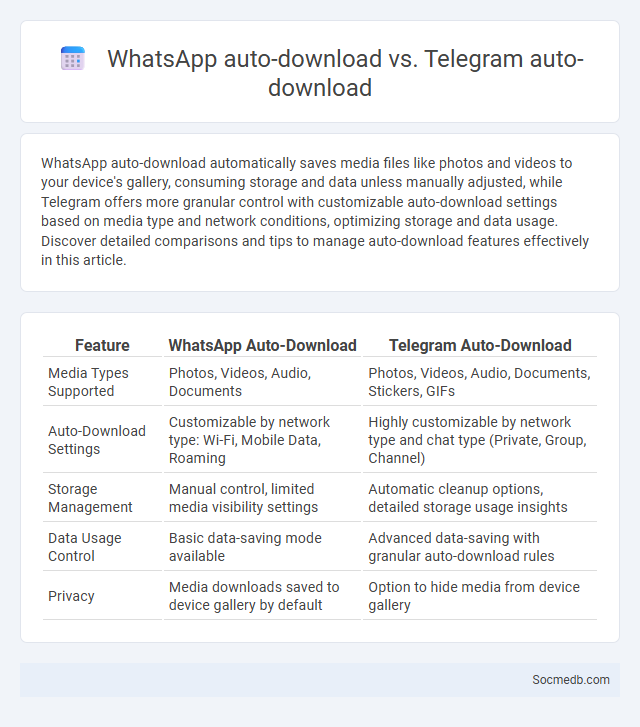
Photo illustration: WhatsApp auto-download vs Telegram auto-download
WhatsApp auto-download automatically saves media files like photos and videos to your device's gallery, consuming storage and data unless manually adjusted, while Telegram offers more granular control with customizable auto-download settings based on media type and network conditions, optimizing storage and data usage. Discover detailed comparisons and tips to manage auto-download features effectively in this article.
Table of Comparison
| Feature | WhatsApp Auto-Download | Telegram Auto-Download |
|---|---|---|
| Media Types Supported | Photos, Videos, Audio, Documents | Photos, Videos, Audio, Documents, Stickers, GIFs |
| Auto-Download Settings | Customizable by network type: Wi-Fi, Mobile Data, Roaming | Highly customizable by network type and chat type (Private, Group, Channel) |
| Storage Management | Manual control, limited media visibility settings | Automatic cleanup options, detailed storage usage insights |
| Data Usage Control | Basic data-saving mode available | Advanced data-saving with granular auto-download rules |
| Privacy | Media downloads saved to device gallery by default | Option to hide media from device gallery |
Overview of Media Auto-Download Features
Social media platforms often include media auto-download features that automatically save videos, images, or audio files onto your device to enhance user experience and accessibility offline. These features can be customized in app settings to control data usage, storage management, and privacy preferences, ensuring media content aligns with your consumption habits. Understanding media auto-download options helps optimize performance and security while maintaining seamless access to your favorite social media content.
WhatsApp Auto-Download: How It Works
WhatsApp auto-download automatically saves incoming media such as photos, videos, and audio files to your device based on your selected network preferences--Wi-Fi, mobile data, or roaming. This feature helps manage storage efficiently by allowing customization of auto-download settings for different types of media within WhatsApp's data and storage usage menu. You can control which files are downloaded automatically, preventing unwanted data consumption and optimizing your device's performance.
Telegram Auto-Download: Key Functions
Telegram's auto-download feature allows users to automatically save photos, videos, voice messages, and documents based on customizable settings like network type and file size. This function enhances user experience by managing data consumption efficiently and ensuring important media is readily accessible offline. Customizable auto-download options help optimize storage use and improve content accessibility across mobile and desktop platforms.
Comparing WhatsApp and Telegram Auto-Download Options
WhatsApp auto-download settings allow users to control media downloads based on network type--Wi-Fi, mobile data, or roaming--offering granular options for photos, audio, videos, and documents. Telegram provides more customizable auto-download controls, including setting download limits by file type and network conditions, with options to disable auto-download during mobile data usage to save bandwidth. Both platforms enhance user experience by balancing convenience and data management, but Telegram's advanced features cater more effectively to users seeking precise control over media consumption.
Storage Management: WhatsApp vs. Telegram
WhatsApp stores chat backups primarily on Google Drive or iCloud, offering limited local storage options that may consume significant device space over time. Telegram relies on cloud storage, allowing users to access messages and media without using local device memory, which optimizes storage management by keeping data on secure servers. To maintain Your device's performance, understanding these differences helps in efficiently managing storage based on your preferred social media platform.
Customization Settings for Media Auto-Download
Customization settings for media auto-download on social media platforms empower users to control data usage and optimize performance by specifying when photos, videos, or audio files automatically download. These settings often include options to restrict auto-downloads to Wi-Fi connections, mobile data, or disable them entirely, enhancing user privacy and saving storage space. Tailoring auto-download preferences improves user experience by balancing convenience with data consumption and device storage management.
Data Usage: WhatsApp vs. Telegram Media Downloads
WhatsApp typically consumes more data during media downloads because it automatically downloads images, videos, and audio files unless users adjust settings, whereas Telegram offers selective download options, reducing unnecessary data usage. Telegram's cloud-based architecture allows media to be stored online rather than on your device, optimizing storage and bandwidth efficiency. Managing your data settings in either app ensures that your usage aligns with your mobile data limits and preferences.
Privacy and Security Considerations
Social media platforms collect vast amounts of personal data, making privacy a critical concern for users who risk exposure to data breaches and unauthorized access. Implementing strong security measures such as end-to-end encryption, two-factor authentication, and regular security audits can significantly reduce vulnerabilities. Users should also review privacy settings frequently to control data sharing and limit the visibility of their personal information.
User Experience and Interface Differences
Social media platforms differ significantly in user experience (UX) and interface design, impacting how users interact with content and navigate features. Platforms like Instagram emphasize visual storytelling with minimal text and intuitive gestures, while Twitter prioritizes brevity and real-time updates with a streamlined feed. Understanding these differences helps you choose the best platform suited to your engagement preferences and content consumption style.
Choosing the Best Messenger for Auto-Download Needs
Choosing the best messenger for auto-download needs depends on factors like file size limits, data usage settings, and platform compatibility. Popular apps such as WhatsApp, Telegram, and Signal offer customizable auto-download options that help manage storage and bandwidth efficiently. You can optimize your messaging experience by selecting a messenger that balances quick access to media files with your device's performance requirements.
 socmedb.com
socmedb.com